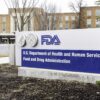Singulair (montelukast) was a blockbuster drug for its manufacturer, Merck. Until last year — when it wasn’t.
Its patent exprired, and Merck, understandably, applied tot he FDA to sell the drug over-the-counter (OTC) to adults for the temporary relief of symptoms due to hay fever or other upper respieatory allergies nasal congestion, runny nose, itchy, watery eyes, sneezing, itching of the nose.
So why did the fDA say no? In short: fear of side effects cause by consumers using it off-label — or not reading the label at all.
Browse This Article
Don’t Look for Singulair in the Allergy Aisle of Your Pharmacy
In May 2014, the Nonprescription Drugs Advisory Committee heard evidence from Merck, patients and physicians, and nixed the proposed switch, voting 11-4 against allowing event limited OTC use.
Why? According to the advisory panel’s transcript, most committee members agreed that the safety of OTC use to relieve allergy symptoms was not adequately demonstrated considering potential off-label use. A particular concern was that people with asthma would use the drug, off-label, which could lead to adverse asthma outcomes due to self-treatment: stopping other asthma medications, and not following up with a health care provider. The advisory committee also noted that in children, allergies and asthma are intertwined. Another red flag concerned neuropsychiatric events in children, which were being evaluated concurrently by a pediatric advisory committee. The committee’s fears about these risks to children were not alleviated by existing data.
So why didn’t Merck see that coming?
The company may have considered that FDA had approved a switch for other allergy drugs, including Sanofi’s corticosteroid nasal spray Nasacort, and Allegra in 2011. Also, with as many as 40 percent of children who suffer from allergic rhinitis, according to the National Institute of Allergy and Infectious Diseases, there is interest in getting more treatments and moving them from prescription to OTC status, which is a cost savings for consumers and the government.
Just look at the numbers: according to the Asthma and Allergy Foundation of America, the annual cost of allergies is estimated to be nearly $14.5 billion.

This is a test to see why the image is not installing correctly. This is a test to see why the image is not installing correctly. This is a test to see why the image is not installing correctly. This is a test to see why the image is not installing correctly. This is a test to see why the image is not installing correctly.
This is a test to see why the image is not installing correctly. This is a test to see why the image is not installing correctly. This is a test to see why the image is not installing correctly. This is a test to see why the image is not installing correctly.
And for adults, allergies (hay fever) is the fifth leading chronic disease and a major cause of work absenteeism and “presenteeism,” (not fully functioning while at work) resulting in nearly 4 million missed or lost workdays each year, resulting in a total cost of more than $700 million in total lost productivity.
So giving consumers another OTC allergy drug at an affordable cost would be a good thing, right? Merck may have thought so, based on the numbers and the precedent FDA set in 2011 with Nasacort and Allegra.
There’s Always a Catch
Here’s the catch: Singulair is in a class of medications called leukotriene inhibitors, which have a growing history of concerning side-effects. In March 2008, FDA sent a letter to all leukotriene inhibitor manufacturers, requesting additional studies to evaluate a possible link to behavior and mood changes, including suicide. Subsequently, Merck updated the prescribing information and patient information for Singulair to include the following post-marketing adverse events: tremor, depression, suicidality, and anxiousness.
Singulair was initially approved as a prescription drug in 1998 to treat asthma in people age 15 or older and the indication was expanded for asthma in patients 12 months and older. Later it was also approved for:
- acute prevention of exercise-induced bronchoconstriction in adults and kids age 6 and older;
- relief of symptoms of allergic rhinitis: seasonal allergic rhinitis in patients age 2 and older;
- perennial allergic rhinitis in patients 6 months and older.
No wonder it became a blockbuster for Merck, and when it went off patent the company felt it. According to Merck’s Quarterly Report of November 7, 2013, the patent that provided U.S. market exclusivity for Singulair expired in August 2012 and the company lost nearly all sales of the drug in the U.S. More bad news followed in February 2013, when the patents that provided market exclusivity for Singulair expired in a number of major European markets, causing further decline.
The third blow struck simultaneously, when generic competition decimated what was left of over $5 billion in peak annual sales.
No surprise that in May 2014, Merck asked the FDA to consider a switch to OTC. Merck sought the OTC switch for use only in adults 18 and older, only for the 10mg tablets, and only for temporary relief of “symptoms due to hay fever or other upper respiratory allergies: nasal congestion, runny nose, itchy, watery eyes, sneezing, itching of the nose.”
That meant the drug would still remain under prescription (i.e. used under physician supervision) for seasonal allergic rhinitis in children as young as 2 years and older and for perennial allergic rhinitis in those as young as 6 months.
Yet it is for children that the side-effects continue to raise red flags. As recently as September 2014 the FDA’s Pediatric Advisory Committee recommended that the FDA issue a letter to alert physicians about potential neuropsychiatric risks for children using Singulair.
That’s why FDA remains vigilant, even after the drug has been approved and used for years. And we should too. So don’t forget to read the label – all of it – the next time you look for over-the-counter medications.





